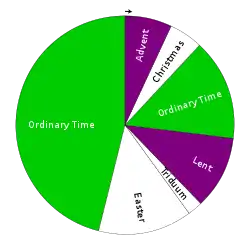O Antiphons
The O Antiphons (also known as the Great Advent Antiphons or Great Os) are Magnificat antiphons used at vespers on the last seven days of Advent in Western Christian traditions.[1] They likely date to sixth-century Italy, when Boethius refers to the text in The Consolation of Philosophy.[2] They subsequently became one of the key musical features of the days leading up to Christmas.[3]
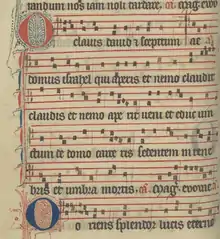
The texts are best known in the English-speaking world in their paraphrased form in the hymn 'O Come, O Come, Emmanuel'.
Sequence
Each text, in the original Latin, begins with the vocative particle "O". Each antiphon is a name of Christ, one of his attributes mentioned in Scripture. They are:
- 17 December: O Sapientia (O Wisdom)
- 18 December: O Adonai (O Lord)
- 19 December: O Radix Jesse (O Root of Jesse)
- 20 December: O Clavis David (O Key of David)
- 21 December: O Oriens (O Dayspring)
- 22 December: O Rex Gentium (O King of the Nations)
- 23 December: O Emmanuel (O With Us is God)
In the Roman rite, the O Antiphons are sung or recited at vespers from 17 December to 23 December inclusive. Some Anglican churches, such as the Church of England, also use them at evensong; often according to medieval English usage, beginning on 16 December.
Origin
The antiphon texts are believed to have originated in Italy in or before the sixth century.[1] Boethius's Consolation of Philosophy includes a passage in which Lady Philosophy appears to cite the series:
Est igitur summum, inquit, bonum quod regit cuncta fortiter suauiterque disponit.
He is the highest good, she said, that rules all things mightily and delightfully arranges them.
The underlying reference is to Wisdom 8:1, but the precise phrasing almost certainly refers to O sapientia.[2]
There were many later traditions throughout the Middle Ages surrounding their performance, and Amalarius wrote a detailed commentary on them in the ninth century.[1]
The first letters of the titles, from last to first, appear to form a Latin acrostic, 'Ero cras', meaning 'Tomorrow, I will be [there]', mirroring the theme of the antiphons. This is formed from the first letter of each title – Emmanuel, Rex, Oriens, Clavis, Radix, Adonai, Sapientia. Such acrostics were popular among early medieval writers, and some scholars have taken this as further evidence for their antiquity, but this view is not universally accepted.[3][1]
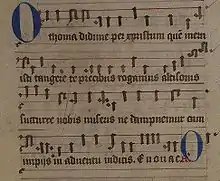
A number of other antiphons were found in various medieval breviaries.[4]
Analysis
The importance of the "O Antiphons" is twofold. First, each one is a title for the Messiah. Secondly, each one refers to the prophecy of Isaiah of the coming of the Messiah. The Latin antiphons are from the Breviarium Romanum. The English versions, which are not always literal translations of the Latin, are from the Church of England's Common Worship liturgy. Biblical quotations are from the NRSV.
O Sapientia
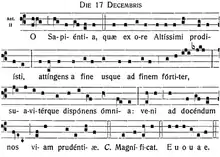
Latin:
- O Sapientia, quae ex ore Altissimi prodiisti,
- attingens a fine usque ad finem,
- fortiter suaviterque disponens omnia:
- veni ad docendum nos viam prudentiae.[5]
English:
- O Wisdom, coming forth from the mouth of the Most High,
- reaching from one end to the other,
- mightily and sweetly ordering all things:
- Come and teach us the way of prudence.
Isaiah had prophesied:
- "The spirit of the Lord shall rest on him, the spirit of wisdom and understanding, the spirit of counsel and might, the spirit of knowledge and the fear of the Lord. His delight shall be in the fear of the Lord." Isaiah 11:2-3
- "[...] he is wonderful in counsel, and excellent in wisdom." Isaiah 28:29
Also compare Sirach 24:1-5 and Wisdom of Solomon 8:1
This prophecy is also relevant in that it describes the Messiah as "coming forth from the mouth of the Most High", which is very significant in light of the Christian doctrine, rooted in the first chapter of the Gospel of John, according to which Jesus Christ, the Messiah, is the Incarnate Word of God the Father.
O Adonai
Latin:
- O Adonai, et Dux domus Israel,
- qui Moysi in igne flammae rubi apparuisti,
- et ei in Sina legem dedisti:
- veni ad redimendum nos in brachio extento.
English:
- O Adonai, and leader of the House of Israel,
- who appeared to Moses in the fire of the burning bush
- and gave him the law on Sinai:
- Come and redeem us with an outstretched arm.
Isaiah had prophesied:
- "[...] but with righteousness he shall judge the poor, and decide with equity for the meek of the earth; he shall strike the earth with the rod of his mouth, and with the breath of his lips he shall kill the wicked. Righteousness shall be the belt around his waist, and faithfulness the belt around his loins." Isaiah 11:4-5
- "For the Lord is our judge, the Lord is our ruler, the Lord is our king; he will save us." Isaiah 33:22
Also compare Exodus 3:2 and Exodus 24:12
O radix Jesse
Latin:
- O radix Jesse, qui stas in signum populorum,
- super quem continebunt reges os suum,
- quem Gentes deprecabuntur:
- veni ad liberandum nos, iam noli tardare.
English:
- O Root of Jesse, standing as a sign among the peoples;
- before you kings will shut their mouths,
- to you the nations will make their prayer:
- Come and deliver us, and delay no longer.
Isaiah had prophesied:
- "A shoot shall come out from the stock of Jesse, and a branch shall grow out of his roots." Isaiah 11:1
- "On that day the root of Jesse shall stand as a signal to the peoples; the nations shall inquire of him, and his dwelling shall be glorious." Isaiah 11:10
Jesse was the father of King David, and Micah had prophesied that the Messiah would be of the house and lineage of David and be born in David’s city, Bethlehem (Micah 5:2). Also compare Isaiah 45:14, Isaiah 52:15 and Romans 15:12. Execution and comment: video.
O clavis David
Latin:
- O Clavis David, et sceptrum domus Israel;
- qui aperis, et nemo claudit;
- claudis, et nemo aperit:
- veni, et educ vinctum de domo carceris,
- sedentem in tenebris, et umbra mortis.
English:
- O Key of David and sceptre of the House of Israel;
- you open and no one can shut;
- you shut and no one can open:
- Come and lead the prisoners from the prison house,
- those who dwell in darkness and the shadow of death.
Isaiah had prophesied:
- "I will place on his shoulder the key of the house of David; he shall open, and no one shall shut; he shall shut, and no one shall open." Isaiah 22:22
- "His authority shall grow continually, and there shall be endless peace for the throne of David and his kingdom. He will establish and uphold it with justice and with righteousness from this time onwards and for evermore." Isaiah 9:7
- "...To open the blind eyes, to bring out the prisoners from the prison, and them that sit in darkness out of the prison house."Isaiah 42:7.
O oriens
Latin:
- O Oriens,
- splendor lucis aeternae, et sol justitiae:
- veni, et illumina sedentes in tenebris, et umbra mortis.
English:
- O Morning Star,
- splendour of light eternal and sun of righteousness:
- Come and enlighten those who dwell in darkness and the shadow of death.
(Note: A literal translation of the Latin yields "O Rising Sun", but the poetic "O Morning Star" or "O Dayspring" is often preferred.)
The phrase O Oriens comes from Zech. 3: 8: τὸν δοῦλόν μου Ἀνατολήν and servum meum Orientem. This should be compared with the Hebrew tzemach. Isaiah had prophesied:
- "The people who walked in darkness have seen a great light; those who lived in a land of deep darkness—on them light has shined." Isaiah 9:2
Also compare Isaiah 60:1-2 and Malachi 4:2 or Malachi 3:20 (Hebrew text)[6]
O rex gentium
Latin:
- O Rex Gentium, et desideratus earum,
- lapisque angularis, qui facis utraque unum:
- veni, et salva hominem,
- quem de limo formasti.
English:
- O King of the nations, and their desire,
- the cornerstone making both one:
- Come and save the human race,
- which you fashioned from clay.
See Haggai 2:7: Et movebo omnes gentes, et veniet desideratus cunctis gentibus. Compare the Greek πάντα τὰ ἔθνη. Isaiah had prophesied:
- "For a child has been born for us, a son given us; authority rests upon his shoulders; and he is named Wonderful Counsellor, Mighty God, Everlasting Father, Prince of Peace." Isaiah 9:6
- "He shall judge between the nations, and shall arbitrate for many peoples; they shall beat their swords into ploughshares, and their spears into pruning-hooks; nation shall not lift up sword against nation, neither shall they learn war anymore." Isaiah 2:4
- "But now, O LORD, thou art our father; we are the clay, and thou our potter; and we all are the work of thy hand.Isaiah 64:8
Also compare Isaiah 28:16 and Ephesians 2:14
O Emmanuel
Latin:
- O Emmanuel, Rex et legifer noster,
- exspectatio Gentium, et Salvator earum:
- veni ad salvandum nos, Domine, Deus noster.
English:
- O Emmanuel, our king and our lawgiver,
- the hope of the nations and their Saviour:
- Come and save us, O Lord our God.
Isaiah had prophesied:
- "Therefore the Lord himself will give you a sign. Look, the young woman is with child and shall bear a son, and shall name him Immanuel." Isaiah 7:14
(Emmanuel means God is with us).
Alternative English usage
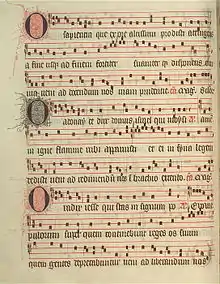
Although the antiphons and dates shown above have been fairly universally recognised throughout western Christendom, an alternative English medieval practice arose of moving all of the antiphons forwards by one day (commencing therefore on 16 December) and adding another (eighth) antiphon on 23 December, with the acrostic thus becoming Vero cras, "truly, tomorrow". This is the antiphon O Virgo virginum (O Virgin of virgins), with the following text:
O Virgo Virginum
Latin:
- O Virgo virginum, quomodo fiet istud?
- Quia nec primam similem visa es nec habere sequentem.
- Filiae Jerusalem, quid me admiramini?
- Divinum est mysterium hoc quod cernitis.
English:
- O Virgin of virgins, how shall this be?
- For neither before thee was any like thee, nor shall there be after.
- Daughters of Jerusalem, why marvel ye at me?
- The thing which ye behold is a divine mystery.
Given the English origins of this alternative, it has traditionally been the version used in the Church of England (including Canterbury Cathedral) until recent times, and is the version printed in traditional Church of England liturgical sources including the English Hymnal and New English Hymnal. From 2000, however, the Church of England appears to have taken an official step away from English medieval practice towards the more widely spread custom, as Common Worship makes provision for the sevenfold version of the antiphons, and not the eightfold version.[7]
This additional antiphon also appears in the Graduale of the Premonstratensian Order and it is still used by those monasteries.
Divine Worship: The Missal (p. 180), used in the Personal Ordinariates uses O Virgo virginum for the Alleluia verse of the morning mass on December 24th. The Personal Ordinariates also use O Virgo Virginum as the Antiphon on the Benedictus at Morning Prayer on the 24th.
Antiphons on the Benedictus
Two more antiphons which also relate to the theme of the anticipated birth of Christ accompany the O Antiphons at Lauds on December 21 and 23. The first, due to the Feast of St. Thomas falling on December 21, is traditionally used instead in the commemoration of the feria. With the transference of the Feast of St. Thomas to July 3 in the revised calendar, these are again used in the Liturgy of the Hours as antiphons. The Monday through Saturday which fall on the days of the O Antiphons also have their own antiphons for the psalms of Lauds, rather than the usual weekday antiphons.
December 21
Nolite timere: quinta enim die veniet ad vos Dominus noster.
- Fear not, for on the fifth day our Lord will come to you.
December 23
Ecce completa sunt omnia, quae dicta sunt per Angelum de Virgine Maria.
- Behold, all things are fulfilled, which were spoken by the Angel to the Virgin Mary.
Use outside vespers
The antiphons are used as the Alleluia verses on the same days in the post-1970 form of the Catholic Mass, although the Lectionary moves O Emmanuel to the 21st,[8] uses Rex Gentium on both the 22nd[9] and 23rd,[10] and places O Oriens on the morning of the 24th,[11] with authorization[12] for the traditional ordering from the 17th through the 23rd.
The Catholic personal ordinariates use the seven O Antiphons as the Alleluia Verse at masses from the 17th to the 23rd, printed in Divine Worship: The Missal in strict traditional ordering, though the Alleluia verses ordered according to the Lectionary (see above) are allowed,[13] adding O Virgo virginum (see below) as the Alleluia verse for masses in the morning of 24 December.[14] The Great O Antiphons are also used as the Antiphon on the Magnificat at Evening Prayer.[15] O Virgo Virginum is used as the Antiphon on the Benedictus at Morning Prayer on the 24th.
Use of the O Antiphons also occurs in many Lutheran churches. In the Book of Common Worship published by the Presbyterian Church (USA), the antiphons can be read as a praise litany at Morning or Evening Prayer.[16] The hymn O come, O come, Emmanuel (in Latin, Veni Emmanuel) is a lyrical paraphrase of these antiphons.[17]
Musical settings
.jpg.webp)
- Carlo Gesualdo, Ô Oriens (1603).
- Jean-Baptiste Geoffroy, Les Antiennes Ô de l'Avent for chorus and bc.
- Marc-Antoine Charpentier completed a setting of the 7 Antiennes Ô H 36-43 in the early 1690s.
- Louis Nicolas Clérambault, 7 Antiennes Ô C.221 - 227 (1700).
- Louis Charles Grénon, 7 Antiennes Ô (1766).
- Ralph Vaughan Williams, The English Hymnal contains a plainsong setting in English
- Herman Strategier, Dutch composer and organist, In the twentieth century, composed Cantica pro tempore natali in 1953, one of his more well-known choral works.[18]
- Arvo Pärt, Estonian composer set a German translation of these antiphons for SATB unaccompanied choir, under the title Magnificat Antiphonen.
- Bob Chilcott, British composer has set the Latin version of these antiphons for SSAATTBB unaccompanied choir, under the title Advent Antiphons.
- Paweł Łukaszewski, include a major setting (35 minutes) in Latin by Polish composer, composed between 1995 and 1999.
- settings by American composers John Muehleisen (1996) and R. Anthony Lee (1999).
- Peter Hallock, the well-known American composer of liturgical music in the Episcopalian and Anglican traditions,, whose two settings were composed in 1986 and 1989.
- Healey Willan, Anglo-Canadian composer, the choral setting of the antiphons continues in use throughout the Anglican Communion.
- Robert Grandy, another Canadian setting was written by for SSAATTBB choir, soloists, organ and handbells.
Selected recordings
- Marc-Antoine Charpentier, Les Antiennes Ô de L’Avent H 36 - 43, Les Arts florissants, direction William Christie. CD Harmonia Mundi 1982. Grand Prix de l’Academie Charles Cros.
- Marc-Antoine Charpentier, Les Antiennes Ô de L’Avent H 36 - 43, Ensemble Correspondances, direction Sébastien Daucé. CD ou LP Harmonia Mundi 2018. Diapason d’or Choc de Classica.
See also
Media
 Antiphon "O Sapientia quae ex ore Altissimi..."
Antiphon "O Sapientia quae ex ore Altissimi..."  Antiphon O Adonai II Great Advent Antiphon
Antiphon O Adonai II Great Advent Antiphon - "BinAural Collaborative Hypertest". Retrieved 19 December 2013.
- "Sapientia". Archived from the original on July 6, 2008. Retrieved 28 November 2007.
- "Adonai". Archived from the original on 20 May 2007. Retrieved 28 November 2007.
- "Radix Jesse". Archived from the original on 24 August 2007. Retrieved 28 November 2007.
- "Oriens". Archived from the original on 24 August 2007. Retrieved 28 November 2007.
- "Rex Gentium". Archived from the original on 25 August 2007. Retrieved 28 November 2007.
References
- Ballhorn, Egbert (1998). "Die O-Antiphonen: Israelgebet der Kirche". Jahrbuch für Liturgik und Hymnologie. 37: 9–34. ISSN 0075-2681. JSTOR 24200651.
- Cabaniss, J. Allen (1947). "A Note on the Date of the Great Advent Antiphons". Speculum. 22 (3): 440–442. doi:10.2307/2856875. ISSN 0038-7134. JSTOR 2856875.
- Cabaniss, Allen (1975). "A Jewish Provenience of the Advent Antiphons?". The Jewish Quarterly Review. 66 (1): 39. doi:10.2307/1454108. ISSN 0021-6682. JSTOR 1454108.
- Herbermann, Charles, ed. (1913). . Catholic Encyclopedia. New York: Robert Appleton Company.
- The Great antiphon for 17 December sung by the Dominican student brothers at Blackfriars in Oxford on YouTube
- Biblia Hebraica Stuttgartensia, p. 1085
- Common Worship: Daily Prayer, Church House Publishing, 2005, ISBN 978-0-7151-2073-6, page 211.
- Lectionary 197
- Lectionary 198
- Lectionary 199
- Lectionary 200
- Lectionary 200
- Divine Worship: The Missal p. 123
- Divine Worship: The Missal pp. 166-181
- Divine Worship: The Missal pp. 162-163
- Bower, Peter C. (2003). The companion to the Book of Common Worship. Geneva Press. p. 100. ISBN 978-0664502324.
- "O come, O come, Emmanuel". Dominican Friars of the Province of St. Joseph. 2011-12-16. Retrieved 19 April 2013.
- "Herman Strategier", Wikipedia (in Dutch), 2019-01-07, retrieved 2019-09-09
External links
| Wikimedia Commons has media related to O antiphons. |
| Wikisource has original text related to this article: |
- "A reflection on the O Antiphons". Anglicans Online. 2005-12-18.
- Hall, A.C.A. (1914). "The Advent Antiphons".
commentary and paraphrase
- Saunders, William. "What are the O Antiphons?". Archived from the original on 2007-02-03.
- "Umilta Website on Julian of Norwich".
